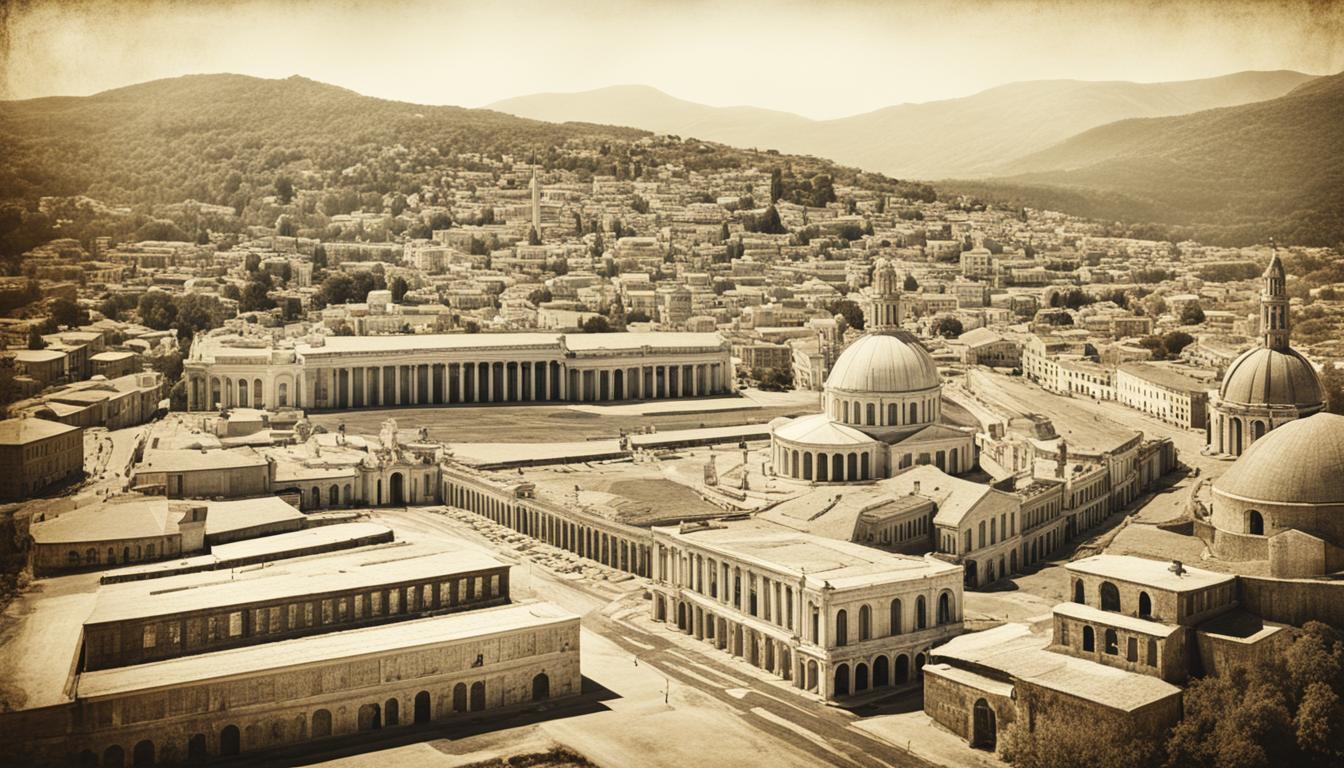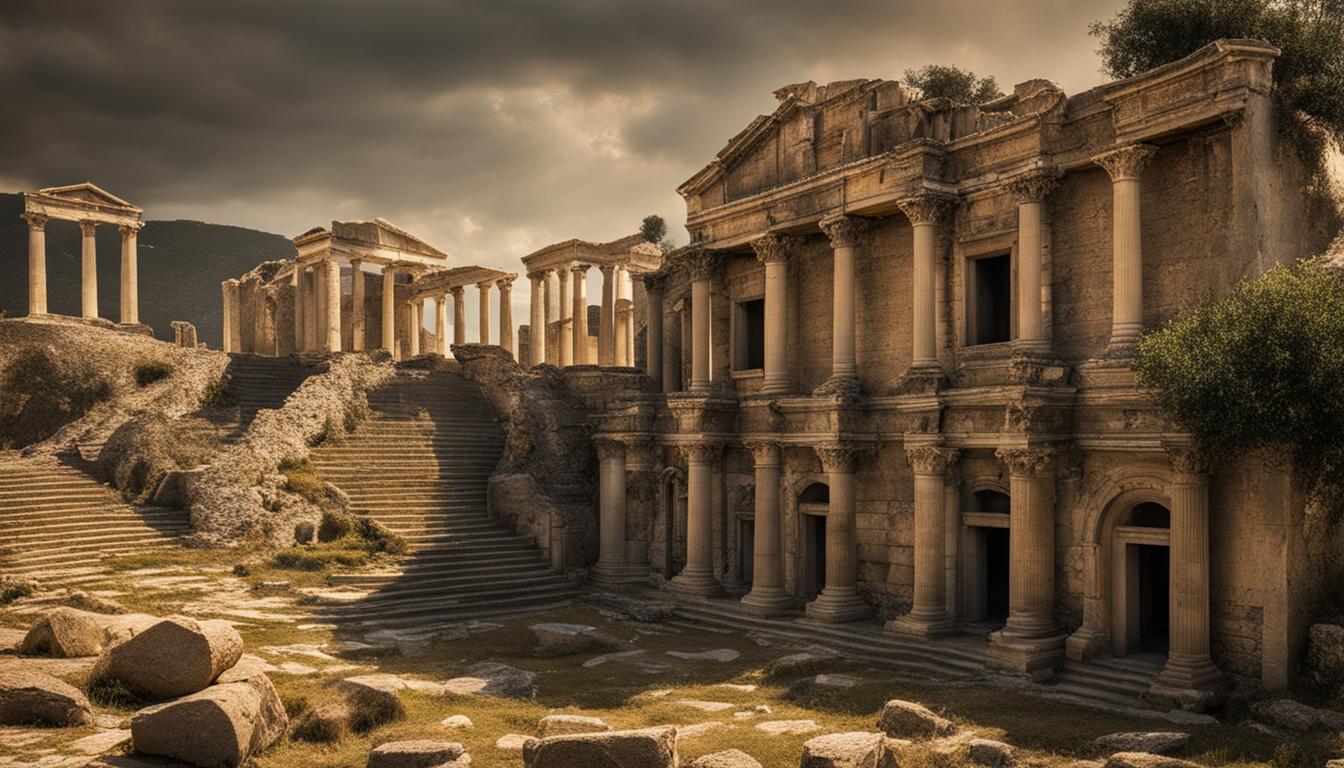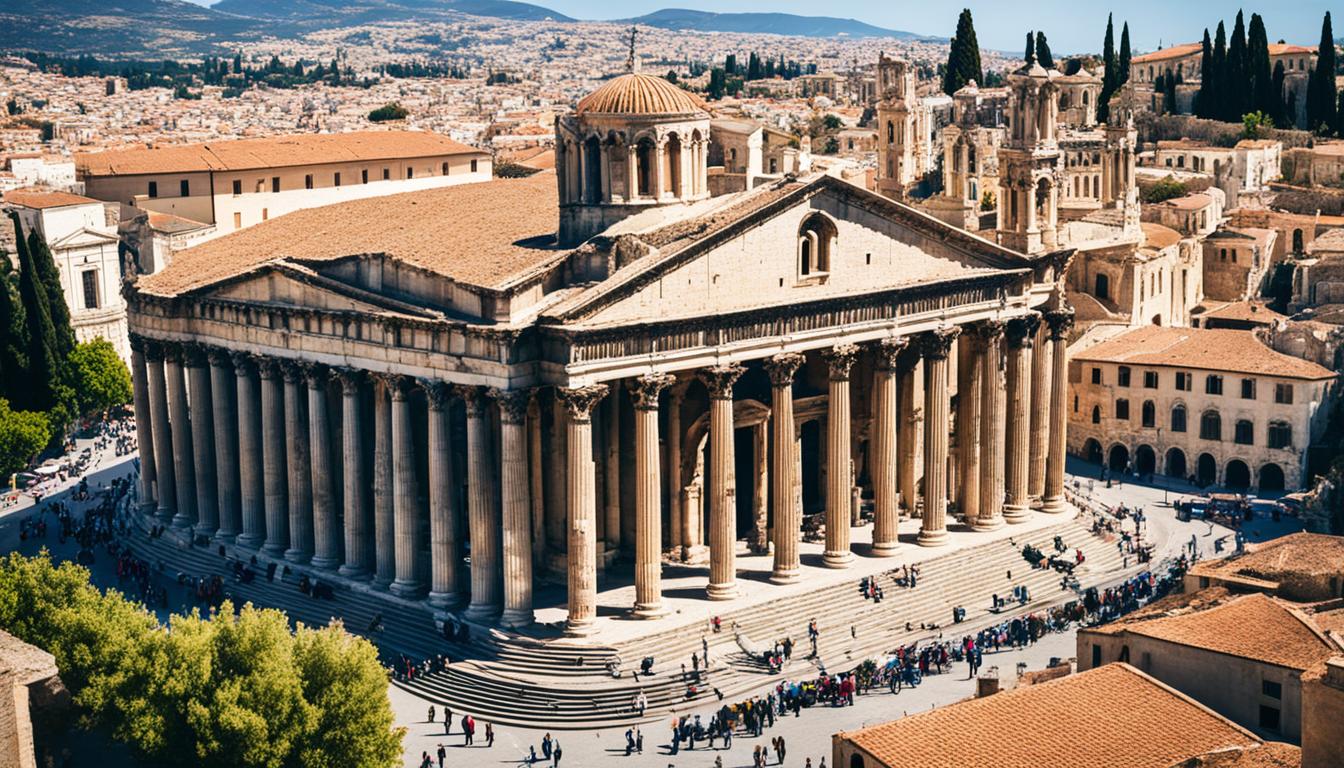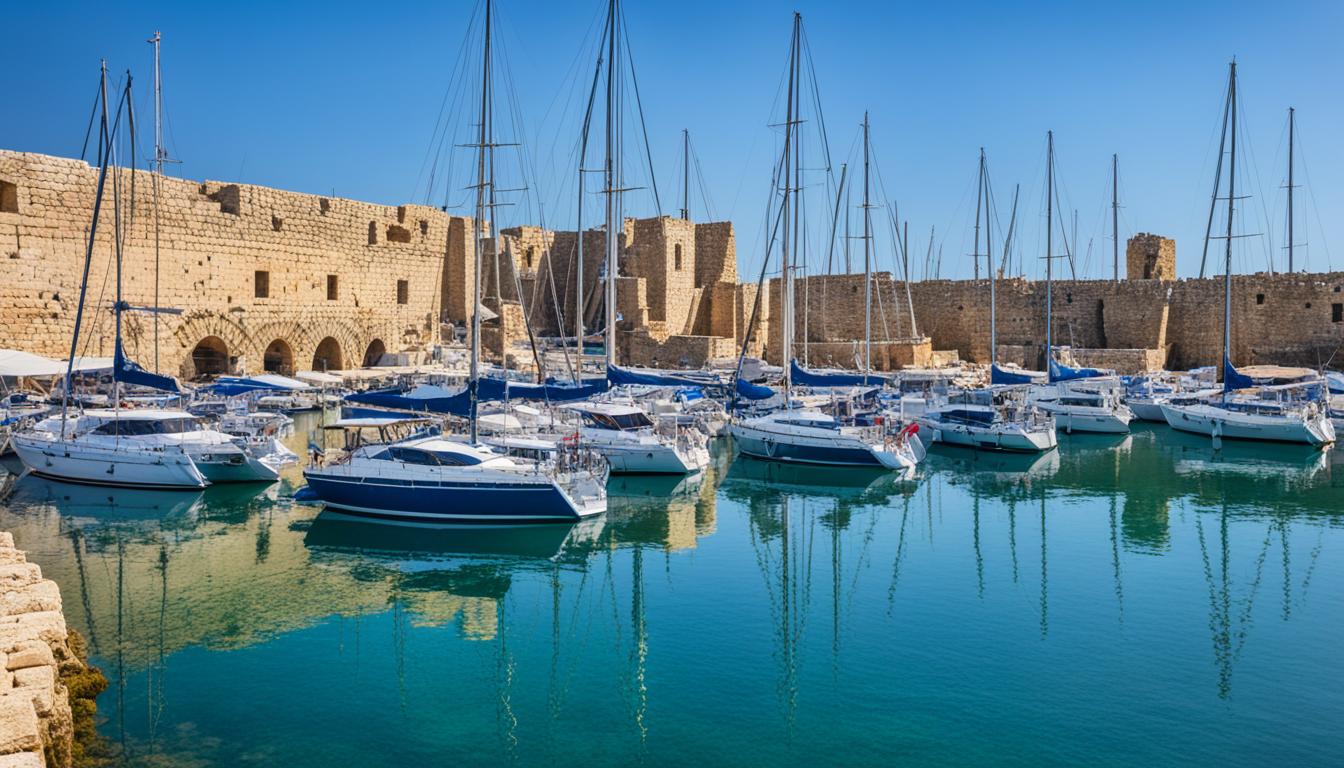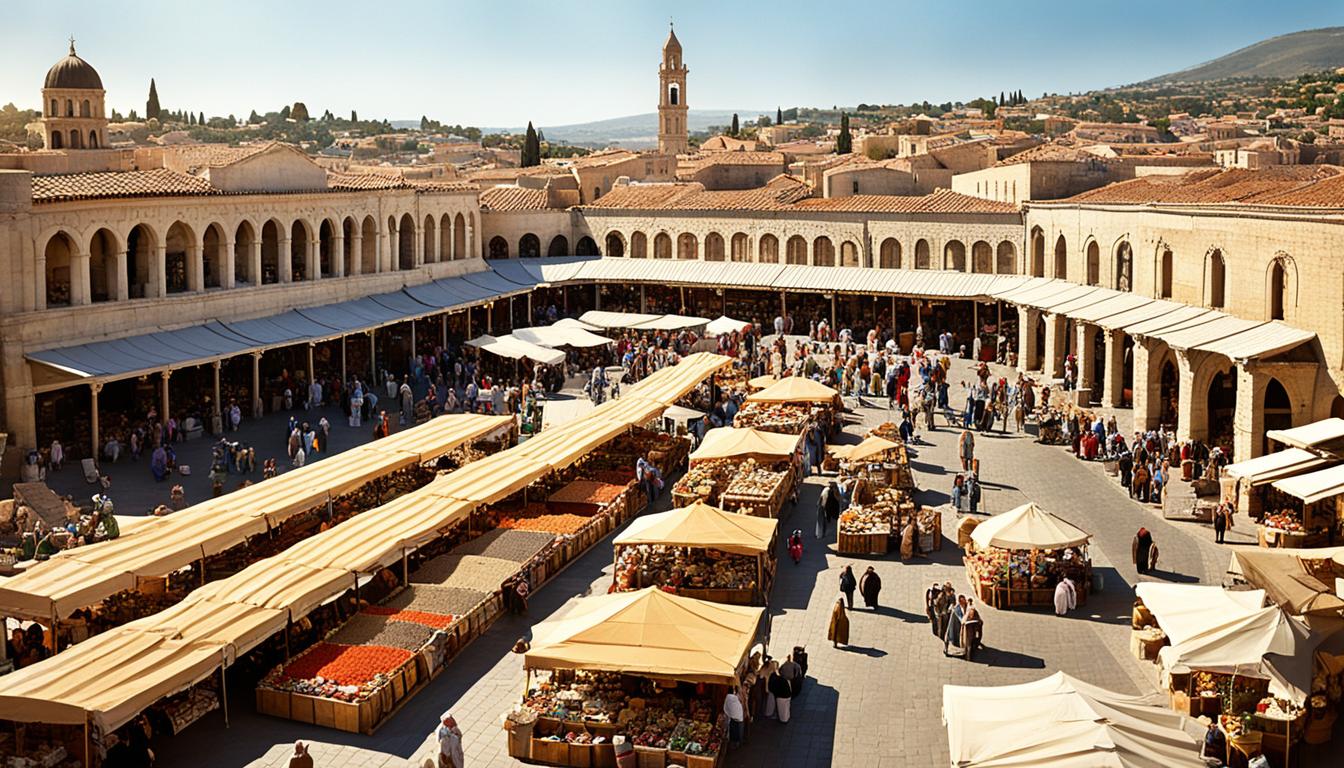Philippi, a city of significant biblical importance, is mentioned prominently in the New Testament. It holds a unique place in scripture, with references found in the Epistles and the Acts of the Apostles. The biblical significance of Philippi goes beyond being a mere geographical location; it encompasses historical events, theological teachings, and cultural practices that shaped the early Christian community.
In Paul’s letters to the Philippians, we gain insights into his deep connection with this city and the profound impact it had on his ministry. From his imprisonment in Philippi to the conversion of Lydia, these biblical stories offer a glimpse into the challenges, triumphs, and spiritual growth experienced by the early Christians in this region.
In this article, we will delve into the historical significance of Philippi, its geographical location, archaeological discoveries, theological themes in the book of Philippians, key biblical events that took place in Philippi, cultural and religious practices, and the prophetic and eschatological significance of this remarkable city.
Key Takeaways:
- Philippi is mentioned in the New Testament and holds significant biblical and historical importance.
- It was the site of Paul’s imprisonment and the founding of the Philippians church.
- Philippi is located in Macedonia, northern Greece, and played a crucial role in trade and communication.
- Excavations in Philippi have uncovered ancient ruins, including a theater, forum, and early Christian churches.
- The book of Philippians emphasizes humility, selflessness, and the example of Jesus Christ.
Historical Significance of Philippi
Philippi, an important city in ancient Macedonia, holds great historical significance. Its prominence dates back to the Battle of Philippi in 42 B.C., a monumental clash that pitted the forces of Octavian and Mark Antony against those of Brutus and Cassius. After the battle, Philippi was re-founded as a Roman colony by Antony and Augustus, solidifying its status as a thriving city in the region.
However, Philippi’s historical significance does not end there. It is also notable for being the first city in Europe that the apostle Paul visited during his missionary journey. Paul’s visit to Philippi is described in detail in the New Testament, particularly in the book of Acts. It was in Philippi that Paul and Silas faced persecution, imprisonment, and witnessed miraculous events that led to their release.
“About midnight Paul and Silas were praying and singing hymns to God, and the prisoners were listening to them. Suddenly there was a great earthquake, so that the foundations of the prison were shaken. And immediately all the doors were opened, and everyone’s bonds were unfastened.” – Acts 16:25-26
Furthermore, Philippi became the site of the founding of the Philippians church, which is mentioned in the book of Philippians. This church held a special place in the heart of the apostle Paul, and he expressed his profound love and gratitude towards the Philippians in his letter to them.
In summary, Philippi’s historical significance is twofold: it gained prominence as a Roman colony after the Battle of Philippi and became a significant location in the New Testament as the first city Paul visited in Europe and the birthplace of the Philippians church.
Geographical Location of Philippi
Philippi, an ancient city of great significance, is located in the region of Macedonia in northern Greece. It occupies a strategic position along the Egnatian Way, a vital Roman commercial road that connected the eastern and western parts of the empire. Situated in a picturesque landscape, Philippi enjoys a prime location with access to fertile agricultural land and favorable trade routes.
The city’s geographical location played a pivotal role in its historical and cultural development. Its proximity to other major cities in Macedonia, such as Amphipolis and Thessaloniki, contributed to its significance as a hub for trade, communication, and cultural exchange.

Strategic Position on the Egnatian Way
As mentioned earlier, Philippi was strategically situated along the Egnatian Way. This ancient Roman road stretched from Dyrrachium in the west to Byzantium (modern-day Istanbul) in the east, traversing several regions and connecting various important cities and centers of commerce.
The Egnatian Way allowed for the efficient movement of goods, soldiers, and travelers, ensuring the city’s economic prosperity and cultural vibrancy. This strategic position granted Philippi access to different cultural influences and opportunities for trade, enriching its society and contributing to its historical significance.
| Geographical Location | Importance |
|---|---|
| Located in Macedonia, northern Greece | Strategic position for trade and communication |
| Situated on the Egnatian Way | Access to major Roman commercial road |
| Proximity to other key cities in Macedonia | Opportunities for cultural exchange and economic growth |
Archaeological Discoveries in Philippi
The ancient ruins of Philippi have been a rich source of archaeological discoveries, shedding light on the city’s vibrant past. Excavations in Philippi have unearthed a multitude of fascinating remnants, revealing the impressive infrastructure and cultural heritage of this ancient Macedonian city.
Among the notable archaeological sites in Philippi is a well-preserved theater, which once served as a gathering place for the city’s residents, where performances and public gatherings took place. This theater stands as a testament to the city’s cultural and social life.
Another significant discovery is the large forum, a central hub for political, commercial, and social activities. The forum showcased the grandeur of Philippi, with its intricately designed structures and bustling marketplace.
In addition to the theater and forum, the excavations have revealed the remains of shops, city gates, and a speaker’s platform, providing valuable insights into the daily life and governance of the ancient city.
A Glimpse into the Past: Structures from the New Testament Era
The archaeological discoveries in Philippi also include structures dating from the New Testament era, offering a unique glimpse into the city’s significance during the early days of Christianity.
One of the notable findings is a sports facility, shedding light on the athletic events and competitions that took place in Philippi. This serves as a reminder of the city’s diverse recreational activities and the importance of physical prowess in ancient times.
Pagan temples have also been uncovered, reflecting the religious beliefs and practices prevalent in Philippi. These ancient sanctuaries were dedicated to various Roman gods and played a central role in the city’s religious life.
Furthermore, the excavations have revealed early Christian churches in Philippi, attesting to the early spread of Christianity in the region and its importance as a center for the burgeoning faith.
| Archaeological Discoveries in Philippi | Description |
|---|---|
| Theater | A well-preserved gathering place for performances and public gatherings. |
| Forum | A central hub for political, commercial, and social activities. |
| Shops | Remnants of ancient shops, giving insight into daily life and commerce. |
| City Gates | Entrance points to the city, showcasing its defensive architecture. |
| Speaker’s Platform | A structure used for public speeches and announcements. |
| Sports Facility | Evidence of athletic events and competitions in ancient Philippi. |
| Pagan Temples | Ancient sanctuaries dedicated to Roman gods, reflecting the city’s religious beliefs. |
| Early Christian Churches | Significant structures revealing the early spread of Christianity in Philippi. |
The archaeological discoveries in Philippi provide a fascinating window into the city’s past, offering valuable insights into its history, culture, and religious practices. These ancient ruins stand as a testament to the rich heritage and significance of Philippi in both the ancient world and the development of Christianity.
Theological Themes in Philippians
The book of Philippians is a treasure trove of theological messages, offering profound insights into the Christian faith. Paul’s letter to the Philippians delves into various themes that are relevant and inspiring for believers today.
1. Humility and Selflessness
Throughout Philippians, Paul emphasizes the significance of humility and selflessness in the Christian life. He encourages believers to imitate the attitude of Jesus Christ, who exemplified humility by emptying Himself and taking on the form of a servant (Philippians 2:5-8).
“Do nothing out of selfish ambition or vain conceit. Rather, in humility value others above yourselves, not looking to your own interests but each of you to the interests of the others” – Philippians 2:3-4.
2. Joy and Gratitude
Another prominent theme in Philippians is the call to rejoice and express gratitude in all circumstances. Despite being imprisoned, Paul exudes joy and encourages believers to find contentment and rejoice in the Lord always (Philippians 4:4-7).
“Rejoice in the Lord always. I will say it again: Rejoice!” – Philippians 4:4.
3. God’s Grace and Empowerment
The letter to the Philippians also highlights the abundant grace of God that enables believers to persevere through challenges. Paul assures that God’s grace is sufficient, and His power is made perfect in weakness (Philippians 4:13).
“I can do all this through him who gives me strength” – Philippians 4:13.
Amidst trials and difficulties, Philippians reminds believers of the unwavering grace of God, providing them with the strength to overcome obstacles and fulfill their purpose in Christ.

Key Biblical Events in Philippi
Philippi is closely connected to several significant biblical events that played a crucial role in shaping the early Christian community in the city.
Paul’s Imprisonment: One of the significant events that took place in Philippi was Paul’s imprisonment. While on his second missionary journey, Paul was unjustly arrested and imprisoned in Philippi for promoting the teachings of Jesus Christ. This event highlighted the persecution faced by early Christians and showcased Paul’s unwavering dedication to spreading the Gospel.
“I thank my God every time I remember you. In all my prayers for all of you, I always pray with joy because of your partnership in the gospel from the first day until now, being confident of this, that he who began a good work in you will carry it on to completion until the day of Christ Jesus.”
– Philippians 1:3-6
Conversion of Lydia: Another significant event in Philippi was the conversion of Lydia, a prominent businesswoman and seller of purple goods. Lydia became one of the early converts to Christianity after hearing Paul’s message. Her conversion is a powerful example of God’s transformative work and the inclusive nature of His grace.
These key biblical events highlight the challenges faced by early believers in Philippi and their unwavering commitment to their faith. They serve as a reminder of the enduring impact of the gospel message and the transformative power of God’s love.

Cultural and Religious Practices in Philippi
Philippi, being a Roman colony, was heavily influenced by Roman culture and customs. The cultural practices in Philippi reflected the Roman ethos, with an emphasis on tradition, social hierarchy, and civic duty.
Religious beliefs in Philippi were rooted in the worship of Roman gods and goddesses. The city was dotted with temples dedicated to various deities, and religious rituals played a significant role in the daily lives of the residents.
The worship of Roman gods was prevalent in Philippi, with ceremonies and sacrifices conducted to honor and appease them. The influence of these religious practices can be seen in the presence of Latin civic inscriptions and dedicatory plaques throughout the city.
However, alongside these traditional beliefs, there was also a growing presence of Christianity in Philippi. The presence of early Christian churches indicates the spread of this new faith in the region. The Christian community brought its own unique religious practices and beliefs, centered around the teachings of Jesus Christ.
The convergence of Roman cultural practices and religious beliefs with the emergence of Christianity created a diverse and dynamic spiritual landscape in Philippi.

Key Highlights:
- Philippi was a Roman colony with strong Roman cultural influence.
- Worship of Roman gods and goddesses was prevalent in the city.
- Latin civic inscriptions and dedicatory plaques were common in Philippi.
- Early Christian churches were present, indicating the spread of Christianity in the region.
Prophetic and Eschatological Significance of Philippi
In the book of Philippians, there are prophetic references and eschatological themes that provide believers with hope for the future and a glimpse into God’s plan. Paul, in his letter to the Philippians, emphasizes the resurrection and the imminent return of Christ, underscoring the eschatological significance of Philippi.
“But our citizenship is in heaven. And we eagerly await a Savior from there, the Lord Jesus Christ, who, by the power that enables him to bring everything under his control, will transform our lowly bodies so that they will be like his glorious body.” – Philippians 3:20-21
Paul’s words remind the believers in Philippi and today of their future hope in Christ. They serve as a prophetic reference to the ultimate fulfillment of God’s promises, including the transformation of believers’ bodies into glorious, resurrected forms.
The eschatological significance of Philippi lies in its portrayal as a place of anticipation and longing for Christ’s return. The Philippians were encouraged to live with an eternal perspective, eagerly awaiting the fulfillment of God’s redemptive plan.
To emphasize the future hope in Philippians, Paul writes:
- “Being confident of this, that he who began a good work in you will carry it on to completion until the day of Christ Jesus.” – Philippians 1:6
- “And my God will meet all your needs according to the riches of his glory in Christ Jesus.” – Philippians 4:19
These passages convey the assurance that God will bring about the fulfillment of His purposes and meet the spiritual and temporal needs of believers until Christ’s return.
Throughout Philippians, the future hope and eschatological significance of Philippi are woven into the fabric of Paul’s teachings, reminding believers to remain steadfast, confident, and expectant of the glorious future that awaits them in Christ.

Stay tuned for the upcoming section that explores the conclusion of our journey through Philippi and the significance of this remarkable city in the Bible!
Conclusion
In conclusion, the exploration of Philippi in the Bible reveals its immense importance both historically and theologically. As the site of significant events in Paul’s ministry, Philippi played a crucial role in the early spread of Christianity. The biblical insights and teachings found in the letters to the Philippians continue to offer valuable guidance and inspiration for believers today.
Philippi’s historical significance is evident in its founding as a Roman colony and its association with the Battle of Philippi. The city’s geographical location on the Egnatian Way further enhanced its strategic importance for trade and communication. Excavations in Philippi have uncovered archaeological treasures that provide a tangible glimpse into the city’s past, giving us a deeper understanding of its biblical context.
From theological themes emphasizing humility and selflessness to key events such as Paul’s imprisonment and the conversion of Lydia, Philippi holds a unique place in the biblical narrative. Its cultural practices and religious beliefs, influenced by Roman culture, add another layer of richness to its story. Additionally, the prophetic and eschatological significance of Philippi points towards a future hope and fulfillment of God’s promises.
In summary, exploring Philippi in the Bible uncovers a wealth of insights that highlight its importance in the early development of Christianity. Through its historical significance, geographical location, archaeological discoveries, theological themes, key events, cultural practices, and prophetic and eschatological significance, Philippi’s relevance resonates with believers seeking to deepen their understanding of the biblical narrative and its relevance to their lives.
FAQ
What is the biblical significance of Philippi?
Philippi holds significant historical and scriptural importance in the Bible. It was a pivotal site in Paul’s missionary journey and played a crucial role in the early development of Christianity.
Where is Philippi located?
Philippi is located in the region of Macedonia in northern Greece.
What key events took place in Philippi?
Philippi was the site of Paul’s imprisonment and miraculous release. It was also where the conversion of Lydia, a seller of purple goods, took place.
What theological themes are found in the book of Philippians?
Philippians emphasizes humility, selflessness, and the example of Jesus Christ. It also highlights the divine grace that enables believers to persevere in difficult circumstances.
What archaeological discoveries have been made in Philippi?
Excavations in Philippi have uncovered various remains, including a theater, a large forum, shops, city gates, and a speaker’s platform. Structures dating from the New Testament era, such as early Christian churches and pagan temples, have also been found.
What were the cultural and religious practices in Philippi?
Philippi was a Roman colony with a strong Roman influence. The city’s cultural practices and religious beliefs reflected the Roman ethos, with worship of Roman gods being prevalent. Latin civic inscriptions can still be found in the city.
What is the prophetic and eschatological significance of Philippi?
The book of Philippians contains prophetic references and eschatological themes, emphasizing the resurrection and the hope of Christ’s return. It encourages believers to live in anticipation of the future fulfillment of God’s promises.
What is the historical significance of Philippi?
Philippi gained prominence after the Battle of Philippi in 42 B.C. and was later re-founded as a Roman colony by Antony and Augustus. It was the first city Paul visited in Europe and the location of the founding of the Philippians church.
Why is Philippi important in the Bible?
Philippi holds a unique place in the Bible. It was the site of significant events in Paul’s ministry and played a crucial role in the early spread of Christianity. The letters to the Philippians provide valuable insights and teachings that are still relevant for believers today.
